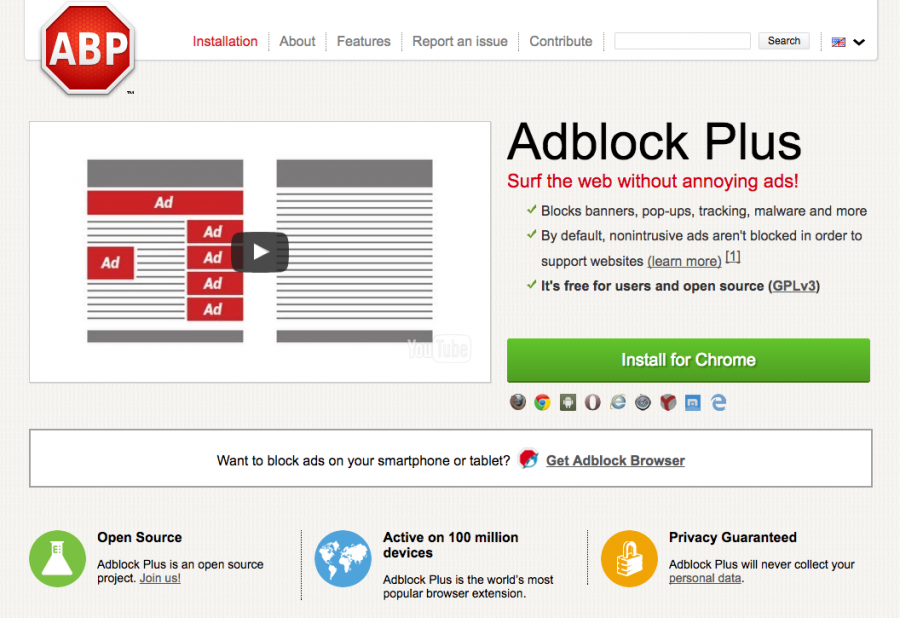First Amendment Friday: Protect your rights online with privacy-focused browser extensions
The Adblock Plus browser extension. Cybersecurity browser extensions similar to Adblock protect user privacy when browsing the internet.
February 10, 2017
Companies whose websites we visit every day aggregate the information you give them by using their online services—your name, birthday, address and most visited websites, for example—and then provide that information to third parties without your control or knowledge.
These organizations’ goals can range from the innocent, such as compiling user statistics, to the less so, like tailoring content to convince you to buy merchandise or provide even more information.
But you can install privacy-focused browser extensions to secure your web use and protect your personal privacy and rights from information traders and invaders. In addition to making your internet experience safer, many of these extensions also have the added benefit of making it faster and smoother.
Ad and script blockers prevent websites from loading online advertisements, plugins, pop-ups, scripted content and other third-party widgets. So-called wide-spectrum blockers can include the functionality of these types of blockers and are often marketed as ad blockers. Malicious advertisements can run scripts to install malware on an unsuspecting user’s computer or allow third-party trackers to freely access any sent data.
While ad blockers can lower website owners’ revenue or block unwanted elements, some advertisements can contain malware, and they can often just be annoying to encounter when browsing.
Many ad blockers’ settings can be changed to prevent overly aggressive blocking or to customize when and where they block ads. AdBlock Plus is an example of a wide-spectrum blocking extension that blocks intrusive ads and external scripts. Its behavior can be disabled or altered on a per-site basis.
As some companies have paid AdBlock Plus to allow non-intrusive ads past the blocker, alternatives include uBlock Origin, a more lightweight blocking extension with similar anti-ad functionality, and script blockers such as NoScript for Firefox and ScriptSafe and ScriptBlock for Google Chrome.
While some ad and script blockers also prevent third-party trackers from monitoring your activity, specialized tools that block trackers can also be worthwhile to install alongside an ad blocker.
Disconnect and Ghostery both block requests from advertisers, statistics analyzers and social media. Users can toggle which detected trackers are blocked and whitelist or blacklist certain pages to customize what the extensions block.
Privacy Badger takes a more learn-along-the-way approach to blocking trackers. As a user visits more websites and encounters more trackers, the extension starts to block them or their cookies if it senses that they are spying on the viewer.
Meanwhile, HTTPS enforcers ensure the use of a secure, authenticated communication protocol on most websites. They are often compatible with other privacy-focused extensions.
HTTPS Everywhere, a Firefox, Chrome and Opera extension created by the Electronic Frontier Foundation, forces encrypted connections and block unencrypted requests. Alternatives to HTTPS Everywhere with the same functionality include HTTP Nowhere for Firefox and KB SSL Enforcer for Chrome.
All of these extensions can help you prevent third-party websites and trackers from collecting your data.


















![“[Building nerf blasters] became this outlet of creativity for me that hasn't been matched by anything else. The process [of] making a build complete to your desire is such a painstakingly difficult process, but I've had to learn from [the skills needed from] soldering to proper painting. There's so many different options for everything, if you think about it, it exists. The best part is [that] if it doesn't exist, you can build it yourself," Ishaan Parate said.](https://harkeraquila.com/wp-content/uploads/2022/08/DSC_8149-900x604.jpg)




![“When I came into high school, I was ready to be a follower. But DECA was a game changer for me. It helped me overcome my fear of public speaking, and it's played such a major role in who I've become today. To be able to successfully lead a chapter of 150 students, an officer team and be one of the upperclassmen I once really admired is something I'm [really] proud of,” Anvitha Tummala ('21) said.](https://harkeraquila.com/wp-content/uploads/2021/07/Screen-Shot-2021-07-25-at-9.50.05-AM-900x594.png)







![“I think getting up in the morning and having a sense of purpose [is exciting]. I think without a certain amount of drive, life is kind of obsolete and mundane, and I think having that every single day is what makes each day unique and kind of makes life exciting,” Neymika Jain (12) said.](https://harkeraquila.com/wp-content/uploads/2017/06/Screen-Shot-2017-06-03-at-4.54.16-PM.png)








![“My slogan is ‘slow feet, don’t eat, and I’m hungry.’ You need to run fast to get where you are–you aren't going to get those championships if you aren't fast,” Angel Cervantes (12) said. “I want to do well in school on my tests and in track and win championships for my team. I live by that, [and] I can do that anywhere: in the classroom or on the field.”](https://harkeraquila.com/wp-content/uploads/2018/06/DSC5146-900x601.jpg)
![“[Volleyball has] taught me how to fall correctly, and another thing it taught is that you don’t have to be the best at something to be good at it. If you just hit the ball in a smart way, then it still scores points and you’re good at it. You could be a background player and still make a much bigger impact on the team than you would think,” Anya Gert (’20) said.](https://harkeraquila.com/wp-content/uploads/2020/06/AnnaGert_JinTuan_HoHPhotoEdited-600x900.jpeg)

![“I'm not nearly there yet, but [my confidence has] definitely been getting better since I was pretty shy and timid coming into Harker my freshman year. I know that there's a lot of people that are really confident in what they do, and I really admire them. Everyone's so driven and that has really pushed me to kind of try to find my own place in high school and be more confident,” Alyssa Huang (’20) said.](https://harkeraquila.com/wp-content/uploads/2020/06/AlyssaHuang_EmilyChen_HoHPhoto-900x749.jpeg)






